The Christians in Rome literally “passed through the test of fire”. During the night of June of that year, when Nero was the emperor, a terrible fire spread violently destroying in six days the principal municipalities of ancient Rome.
The description of the disaster that Tacitus had recorded in his Annals which was written approximately fifty years after the catastrophe pertains to one of the more notable pieces of classic literature. Its distinction becomes even more pronounced, considering that he is a pagan author, the most important Roman historian, who wrote something about the most significant event of human history: Christianity and the violent death of its founder, Christ:
“A disaster followed, whether accidental or treacherously contrived by the emperor, is uncertain, as authors have given both accounts, worse, however, and more dreadful than any which had ever happened to this city by the violence of fire.
Added to this were the wailings of terror-stricken women, the feebleness of age, the helpless inexperience of childhood, the crowds who sought to save themselves or others, dragging out the infirm or waiting for them, and by their hurry in the one case, by their delay in the other, aggravating the confusion. Often, while they looked behind them, they were intercepted by flames on their side or in their face. Or if they reached a refuge close at hand, when this too was seized by the fire, they found that, even places, which they had imagined to be remote, were involved in the same calamity.
And no one dared to stop the mischief, because of incessant menaces from a number of persons who forbade the extinguishing of the flames, because again others openly hurled brands, and kept shouting that there was one who gave them authority, either seeking to plunder more freely, or obeying orders. Nero at this time was at Antium, and did not return to Rome until the fire approached his house, which he had built to connect the palace with the gardens of Maecenas.
These acts, though popular, produced no effect, since a rumour had gone forth everywhere that, at the very time when the city was in flames, the emperor appeared on a private stage and sang of the destruction of Troy, comparing present misfortunes with the calamities of antiquity. At last, after five days, an end was put to the conflagration at the foot of the Esquiline hill, by the destruction of all buildings on a vast space, so that the violence of the fire was met by clear ground and an open sky. But before people had laid aside their fears, the flames returned, with no less fury this second time, and especially in the spacious districts of the city. Consequently, though there was less loss of life, the temples of the gods, and the porticoes which were devoted to enjoyment, fell in a yet more widespread ruin. And to this conflagration there attached the greater infamy because it broke out on the Aemilian property of Tigellinus, and it seemed that Nero was aiming at the glory of founding a new city and calling it by his name.
Nero meanwhile availed himself of his country’s desolation, and erected a mansion in which the jewels and gold, long familiar objects, quite vulgarised by our extravagance, were not so marvelous as the fields and lakes, with woods on one side to resemble a wilderness, and, on the other, open spaces and extensive views.
Such indeed were the precautions of human wisdom. The next thing was to seek means of propitiating the gods, and recourse was had to the Sibylline books, by the direction of which prayers were offered to Vulcanus, Ceres, and Proserpina. Juno, too, was entreated by the matrons, first, in theCapitol, then on the nearest part of the coast, whence water was procured to sprinkle the fane and image of the goddess.
But all human efforts, all the lavish gifts of the emperor, and the propitiations of the gods, did not banish the sinister belief that the conflagration was the result of an order. Consequently, to get rid of the report, Nero fastened the guilt and inflicted the most exquisite tortures on a class hated for their abominations, called Christians by the populace. Christus, from whom the name had its origin, suffered the extreme penalty during the reign of Tiberius at the hands of one of our procurators, Pontius Pilatus, and a most mischievous superstition, thus checked for the moment, again broke out not only in Judaea, the first source of the evil, but even in Rome, where all things hideous and shameful from every part of the world find their centre and become popular.
Accordingly, an arrest was first made of all who pleaded guilty; then, upon their information, an immense multitude was convicted, not so much of the crime of firing the city, as of hatred against mankind. Mockery of every sort was added to their deaths. Covered with the skins of beasts, they were torn by dogs and perished, or were nailed to crosses, or were doomed to the flames and burnt, to serve as a nightly illumination, when daylight had expired.
Nero offered his gardens for the spectacle, and was exhibiting a show in the circus, while he mingled with the people in the dress of a charioteer or stood aloft on a car. Hence, even for criminals who deserved extreme and exemplary punishment, there arose a feeling of compassion; for it was not, as it seemed, for the public good, but to glut one man’s cruelty, that they were being destroyed.”
(The Works of Tacitus, tr. by Alfred John Church and William Jackson Brodribb)
But he (Nero) showed no greater mercy to the people or the walls of his capital. For under cover of displeasure at the ugliness of the old buildings and the narrow, crooked streets, he set fire to the city so openly that several ex-consuls did not venture to lay hands on his chamberlains although they caught them on their estates with tow and fire-brands, while some granaries near the Golden House, whose room he particularly desired, were demolished by engines of war and then set on fire, because their walls were of stone. For six days and seven nights destruction raged, while the people were driven for shelter to monuments and tombs.
At that time, besides an immense number of dwellings, the houses of leaders of old were burned, still adorned with trophies of victory, and the temples of the gods vowed and dedicated by the kings and later in the Punic and Gallic wars, and whatever else interesting and noteworthy had survived from antiquity.
Viewing the conflagration from the tower of Maecenas and exulting, as he said, in “the beauty of the flames,” he sang the whole of the “Sack of Ilium,” in his regular stage costume. Furthermore, to gain from this calamity too all the spoil and booty possible, while promising the removal of the debris and dead bodies free of cost he allowed no one to approach the ruins of his own property; and from the contributions which he not only received, but even demanded, he nearly bankrupted the provinces and exhausted the resources of individuals.
(The Lives of the Twelve Caesars by C. Suetonius Tranquillus, published in the Loeb Classical Library)
Their feast day is June 30.

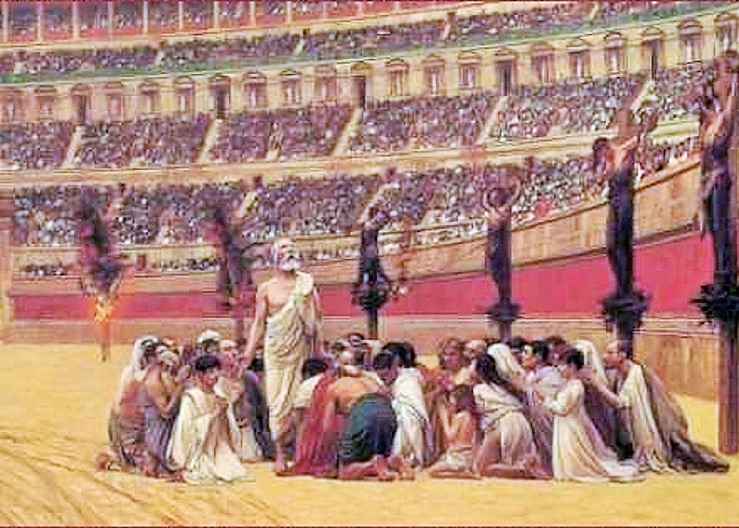

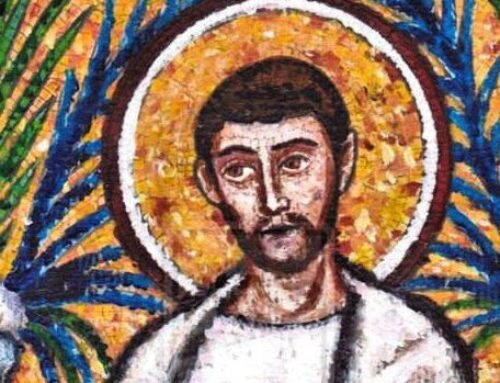
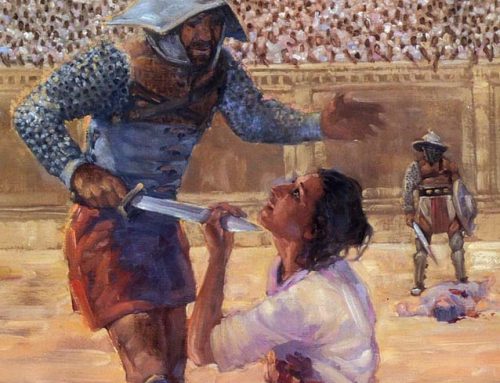
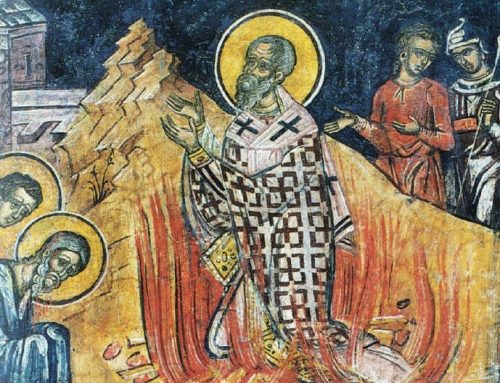
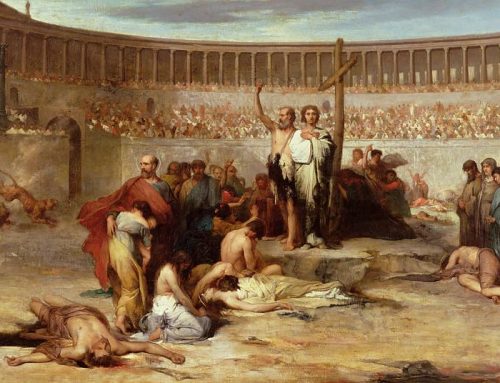
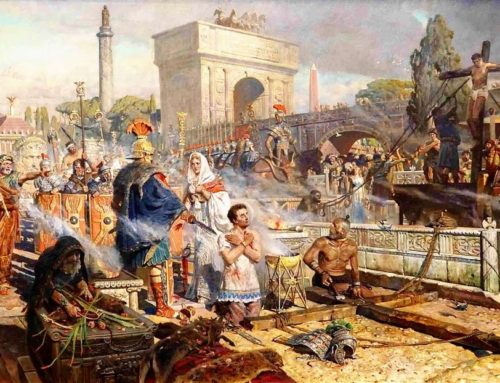
Leave A Comment
You must be logged in to post a comment.